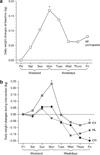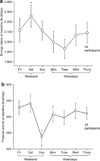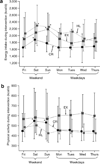Influence of weekend lifestyle patterns on body weight
- PMID: 18551108
- PMCID: PMC3740215
- DOI: 10.1038/oby.2008.320
Influence of weekend lifestyle patterns on body weight
Abstract
Objective: To determine whether alterations in diet and/or activity patterns during weekends contribute to weight gain or hinder weight loss.
Methods and procedures: Randomized, controlled trial comparing 1 year of caloric restriction (CR) with 1 year of daily exercise (EX). Subjects included 48 healthy adults (30F, 18M) aged 50-60 years with BMI 23.5-29.9 kg/m(2). Body weight was measured on 7 consecutive mornings for a total of 165 weeks at baseline and 437 weeks during the 1-year interventions. Daily weight changes were calculated for weekends (Friday to Monday) and weekdays (Monday to Friday). Daily energy intake was estimated using food diaries; daily physical activity was measured using accelerometers. Both measures were validated against doubly labeled water (DLW).
Results: At baseline, participants consistently gained weight on weekend days (+0.06 +/- 0.03 kg/day, (mean +/- s.e.), P = 0.02), but not on weekdays (-0.02 +/- 0.02 kg/day, P = 0.18). This was attributable to higher dietary intake on Saturdays and lower physical activity on Sundays relative to weekdays (both P < 0.05). During the interventions, both CR and EX participants were in negative energy balance on weekdays (P < 0.005). On weekends, however, CR participants stopped losing weight, and EX participants gained weight (+0.08 +/- 0.03 kg/day, P < 0.0001) due to higher dietary intakes on weekends. This helps to explain the slower-than-expected rate of weight loss during the interventions.
Discussion: Alterations in lifestyle behaviors on weekends contribute to weight gain or cessation of weight loss on weekends. These results provide one explanation for the relatively slow rates of weight loss observed in many studies, and the difficulty with maintaining significant weight loss.
Conflict of interest statement
The authors declared no conflict of interest.
Figures



References
-
- Klesges RC, Klem ML, Bene CR. Effects of dietary restraint, obesity, and gender on holiday eating behavior and weight gain. J Abnorm Psychol. 1989;98:499–503. - PubMed
-
- Gorin AA, Phelan S, Wing RR, Hill JO. Promoting long-term weight control: does dieting consistency matter? Int J Obes Relat Metab Disord. 2004;28:278–281. - PubMed
Publication types
MeSH terms
Grants and funding
LinkOut - more resources
Full Text Sources
Medical

